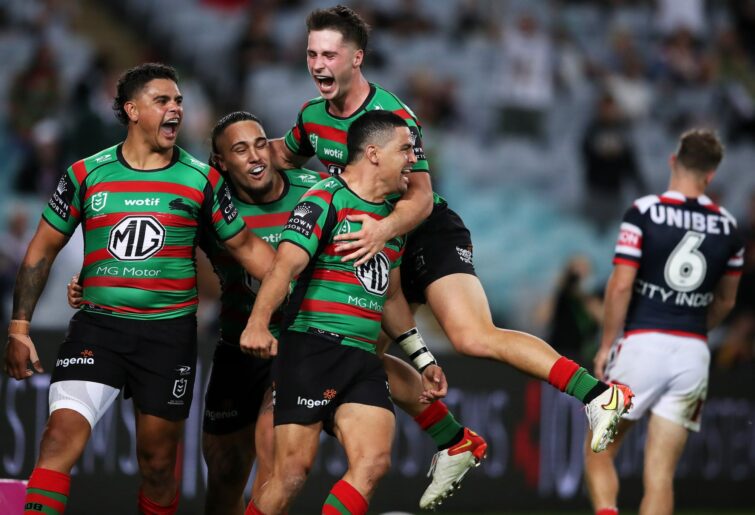The NRL’s decision to support the Indigenous Voice to Parliament joins what will be a growing chorus of sporting organisations weighing in on this year’s referendum.
Certainly, the common rhetoric of “keep politics out of sport” will be thrown from sporting diehards across the country. While all opinions are valid and everyone is entitled to their view, it is imperative that fans understand that politics is inherently fixed in sporting codes.
On the surface, it seems that political infiltration is cautionary and in some forms, dangerous. However, sports history informs us that political intervention was inevitable.
First, in the early 19th to mid 20th century, sport was essentially a working-class tradition – insofar as football’s classification as ‘the people’s game’. Indeed, sport found itself deeply ingrained in working-class roots, to the extent that clubs were often owned by working-class organisations or collaboratively confined to working-class leisure.
Fast forward to the present, commercialisation and neoliberalism has essentially transformed sport into a wash of corporate identity, conservative roots and ruling-class power. Club owners have the ability to assemble top playing rosters through so called third-party deals – look no further than Nick Politis’ Roosters as an example.
While LGBTQI jerseys and flags are indicative of political association in sporting events, corporate washing in sport is the offspring of ruling-class elites with significant political clout.
Under these circumstances, sport is a mechanism to conform to conservative values. But it is also a way of expressing social values, equality and opportunity as its historical past informs. Therefore, sport is a theatre to political ideology.
Undoubtedly, separation between politics and sport would be ideal for some, but with clubs at the behest of CEOs, finances and sponsorships, separating the two is impossible.
Of course, athletes are not immune from political association.
One must only refer to Muhammad Ali’s refusal of US military indoctrination, and subsequent dispossession of his world heavyweight title, to understand the political weight of professional sports.
One must only refer to the sight of African American NFL players taking a knee to recognise sports tribalism is, in some capacity, compatible with social expression. And, therefore, inseparable from the political spotlight.
All examples are valid forms of political assertion in sport.
From a fan’s perspective, would we enjoy the bitter rivalries shared between working-class western Sydney and ruling class east without class identity politics? Sports tribalism and subsequent fan engagement is the foundation of embellishing rivalries that steal the headlines and dominate the weekly pub talk.
Without political association, rivalries would have no teeth, nor would they be symbolic of historical dynamism capable of attracting fans far and wide.
For that matter, the political theatre and historical dynamism between South Sydney Rabbitohs and Sydney Roosters clashes are central to the excitement when the two sides collide.

Cody Walker celebrates with Latrell Mitchell, Keaon Koloamatangi and Lachlan Ilias. (Photo by Matt King/Getty Images)
In both a historical and contemporary context, sport has always identified with forms of political identity – be it working-class representation, corporate prosperity or social expression.
The NRL has every right to recognise political and social responsibility. In this case, supporting the Indigenous Voice to Parliament is fundamental to respecting its Indigenous council and playing cohort.
“Recognition and listening. That’s how we can make a practical difference and move Australia forward for everyone,” Minister for Indigenous Australians, Linda Burney, wrote on social media.
“True change comes through listening, learning and taking action – and we encourage everyone in the rugby league community to get informed by the facts, and use their voice, so that we can move forward together.”
If athletes are willing to express social equality in sport, if clubs are willing to align with CEOs and corporations covered with political influence, then sporting codes across Australia are obligated to support motions that affect their constituents. In this case, the Voic will be crucial to the prosperity and opportunities of Indigenous athletes right around the country.
Whether we like it or not, sport is the endowment of politics. From its class identity, to tribalist sentiment, sport will always be the embodiment of political association.
The NRL’s support behind the Voice is crucial to its diverse community and constitutes. But the combination of politics and sport is the lifeblood behind tribalism, crowd enthusiasm and, most importantly, giving sport a legitimate identity. The Anzac, Indigenous and multicultural rounds are proven examples of tribalism and politics joining for the common good.
Without the relationship between politics and sport, the roar of the crowd would not be so loud.





























































































